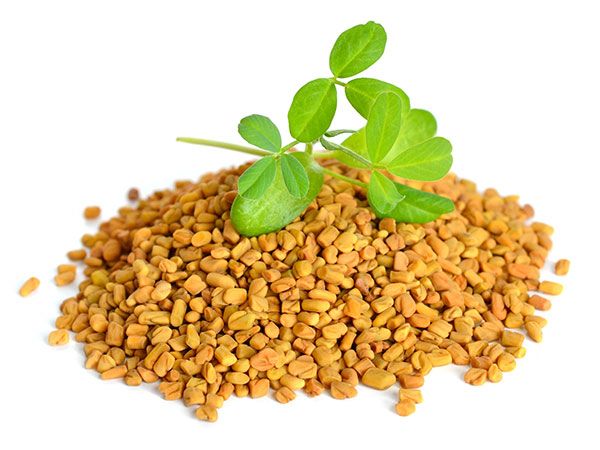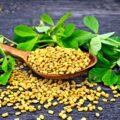What is fenugreek?
Fenugreek is an herb long used in alternative medicine. It’s a common ingredient in Indian dishes and is often taken as a supplement. Known scientifically as Trigonella foenum-graecum, Fenugreek is a plant that stands around 2–3 feet (60–90 cm) tall. It has green leaves, small white flowers, and pods that contain small, golden-brown seeds. For thousands of years, fenugreek has been used in alternative and Chinese medicine to treat skin conditions and many other diseases.
Recently, it has become a common household spice and thickening agent. It can also be found in products, such as soap and shampoo. Before we discuss how to use Fenugreek for breast enlargement, let us look at other scientifically-proven benefits of the plant. Among other benefits, some research suggests that fenugreek may:
Reduce the risk of diabetes: In a 2017 study, mice fed a high-fat diet with 2 percent whole fenugreek seed supplementation for 16 weeks had better glucose tolerance than those who did not receive the supplementation. However, the fenugreek did not improve glucose tolerance in the mice who ate a low-fat diet. Also, the authors concluded that 4 days of voluntary exercise on a spinning wheel was ultimately more effective at improving glucose tolerance in all the mice than fenugreek. Overall, the researchers found fewer benefits from fenugreek than they expected.
Improve milk production and flow: Fenugreek may help stimulate breast milk production and ease the flow. Practitioners of traditional Asian medicine have long recommended fenugreek for this purpose. In a 2014 study, 25 women who had recently given birth drank three cups of fenugreek tea daily for 2 weeks and saw an increase in milk volume in the first weeks.
Improve weight loss: Fenugreek may suppress the appetite and increase feelings of fullness, which could help reduce overeating and lead to weight loss. In a 2015 study, nine overweight female Korean participants drank fennel, fenugreek, or placebo tea before lunch. Those who drank fenugreek tea reported feeling less hungry and more full. However, the tea did not cause the participants to consume less. Because of the fiber content, fenugreek fiber extract powders may also lead to a feeling of fullness.
Raise testosterone and boost sperm count: Fenugreek may help increase low testosterone and sperm levels. In a 2017 study, 50 male volunteers took an extract of fenugreek seeds for 12 weeks. About 85 percent of the participants had an increased sperm count. The results also indicate that the extract consistently improved mental alertness, mood, and libido.
Reduce inflammation: The substantial levels of antioxidants in fenugreek give it great potential as an anti-inflammatory agent. Results of a 2012 study in mice suggest that the high antioxidant flavonoid content in fenugreek seeds can reduce inflammation.
Reduce the risk of heart and blood pressure conditions: Fenugreek may help regulate cholesterol levels and improve blood pressure, which can reduce the risk of developing heart conditions and improve heart health. This may be because fenugreek seeds contain roughly 48 percent dietary fiber. Dietary fiber is very hard to digest, and it forms a viscous gel in the intestines that makes it harder to digest sugars and fats.
Pain relief: Fenugreek has long been used for pain relief in traditional systems of medicine. Researchers think that compounds called alkaloids in the herb help block sensory receptors that allow the brain to perceive pain. In a 2014 study, 51 women with painful periods took capsules of fenugreek seed powder three times a day for the first 3 days of their periods for 2 consecutive months. They experienced a shorter duration of pain and fewer symptoms between the months. SEE: Kigelia Africana Extract Benefits and Side Effects
Side Effects of Fenugreek
Fenugreek is LIKELY SAFE for people when taken by mouth in amounts normally found in foods. It is POSSIBLY SAFE when taken by mouth in amounts used for medicinal purposes (amounts larger than normally found in food) for up to 6 months. Side effects include diarrhea, stomach upset, bloating, gas, dizziness, headache, and a “maple syrup” odor in urine. Fenugreek can cause nasal congestion, coughing, wheezing, facial swelling, and severe allergic reactions in hypersensitive people. Fenugreek might lower blood sugar.
Special Precautions & Warnings
Pregnancy: Fenugreek is LIKELY SAFE in pregnancy when used in amounts greater than those in food. It might cause early contractions. Taking fenugreek just before delivery may also cause the newborn to have an unusual body odor, which could be confused with “maple syrup urine disease.” It does not appear to cause long-term effects.
Breast-feeding: Fenugreek is POSSIBLY SAFE when taken by mouth to increase breast-milk flow in the short term. Some research shows that taking 1725 mg of fenugreek three times daily for 21 days does not cause any side effects in infants.
Children: Fenugreek is POSSIBLY SAFE when taken by mouth in children. Some reports have linked fenugreek tea to loss of consciousness in children. An unusual body odor resembling maple syrup may also occur in children drinking fenugreek tea.
Allergy to plants in the Fabaceae family: People who are allergic to other plants in the Fabaceae, including soybeans, peanuts, and green peas might also be allergic to fenugreek.
Diabetes: Fenugreek can affect blood sugar levels in people with diabetes. Watch for signs of low blood sugar (hypoglycemia) and monitor your blood sugar carefully if you have diabetes and use fenugreek.
Are there any interactions with medications?
Medications for diabetes (Antidiabetes drugs)Interaction Rating: Moderate Be cautious with this combination. Talk with your health provider.
Fenugreek might lower blood sugar. Diabetes medications are also used to lower blood sugar. Taking fenugreek along with diabetes medications might cause your blood sugar to go too low. Monitor your blood sugar closely. The dose of your diabetes medication might need to be changed.
Some medications used for diabetes include glimepiride (Amaryl), glyburide (DiaBeta, Glynase PresTab, Micronase), insulin, pioglitazone (Actos), rosiglitazone (Avandia), chlorpropamide (Diabinese), glipizide (Glucotrol), tolbutamide (Orinase), and others.
Medications that slow blood clotting (Anticoagulant / Antiplatelet drugs) Interaction Rating: Moderate Be cautious with this combination. Talk with your health provider.
Fenugreek might slow blood clotting. Taking fenugreek along with medications that also slow clotting might increase the chances of bruising and bleeding.
Some medications that slow blood clotting include aspirin, clopidogrel (Plavix), diclofenac (Voltaren, Cataflam, others), ibuprofen (Advil, Motrin, others), naproxen (Anaprox, Naprosyn, others), dalteparin (Fragmin), enoxaparin (Lovenox), heparin, warfarin (Coumadin), and others.
Theophylline Interaction Rating: Moderate Be cautious with this combination. Talk with your health provider.
Fenugreek might reduce how much theophylline is absorbed in the body. In theory, using fenugreek while taking theophylline might reduce the effects of theophylline.
Warfarin (Coumadin) Interaction Rating: Moderate Be cautious with this combination. Talk with your health provider.
Warfarin (Coumadin) is used to slow blood clotting. Fenugreek might also slow blood clotting. Taking fenugreek along with warfarin (Coumadin) might increase the chances of bruising and bleeding. Be sure to have your blood checked regularly. The dose of your warfarin (Coumadin) might need to be changed.





